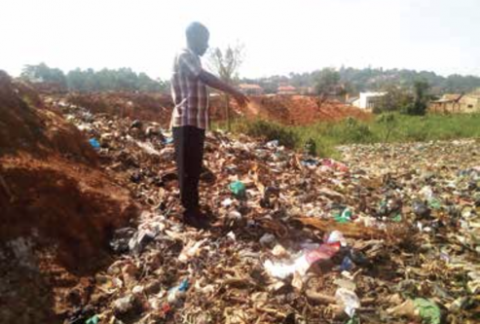The Impact of COVID-19 Pandemic on Plastic Wastes and Chemicals in Uganda

This project, carried out by Action Coalition on Climate Change (ACCC), sought to raise and deepen awareness and document chemical and waste consequences as a result of the COVID-19 pandemic. It was carried out in Kampala and Wakiso districts. ACCC conducted a rapid assessment study, and found, amongst other things, that the outbreak of the pandemic has worsened the complexities of plastic waste management. The pandemic resulted in massive use of personal protective equipment (PPE), much of which contains a substantial proportion of plastic as the most reliable and affordable defense against infection and transmission of the virus. The increased demand for single-use PPE by doctors and other health care workers and the use of masks for the public has increased the generation of plastic waste. This waste hitherto has been littered in different public places, including key water bodies such as lakes.
As part of the study, ACCC conducted focus group discussions, strategic meetings, photography and observations, literature reviews and field visits. Strategic meetings were convened with technical and policy makers, media, companies dealing in chemical and waste products, government agencies, academic and research institutions, and public interest NGOs. The focus group discussions were carried out with different households, community leaders, women's groups, dealers in plastic wastes, and opinion leaders. ACCC also conducted a webinar with the public to get their experiences on the subject matter, and participated in a radio talk show.
At the conclusion of the project, ACCC prepared numerous recommendations, among which included:
- The government should enact and enforce strict policies and legislation on plastic waste. ACCC states that Uganda does not have any serious environmental laws on disposal of plastics and the existing laws are never enforced. Many companies and investors were allowed to produce a variety of plastic-related PPEs and containers in Uganda without any law governing them.
- There is an urgent need to raise the awareness of the entire public on issues of plastic wastes and how it should be managed. There is a need to sensitize the public about the environmental and health damage caused by plastics.
- The government and businesses should identify and promote non-fossil fuel plastic substitutes.
- Regular vigilance is required in the public and by the responsible authorities such as the Uganda National Bureau of Standards, National Drug Authority, and Ministry of Gender, Labour and Social Development over counterfeit hand sanitizers that have flooded the market. All sanitizers and other related chemicals in the market should be well labeled and authorized for the purpose.
This project relates to Sustainable Development Goals 3, 6, 11, 12, 13, 14 and 15.
Special thanks to IPEN's Anglophone Africa Regional Coordinator Silvani Mng'anya and Anglophone Africa Regional Hub AGENDA for their important contributions to the development and finalization of the project.
| Attachment | Size |
|---|---|
| 2.79 MB | |
| 237.57 KB |
